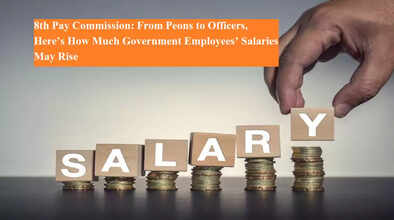8th Pay Commission: From Peons to Officers, Here’s How Much Government Employees’ Salaries May Rise

The Central Government has officially announced the 8th Pay Commission, sparking excitement among more than one crore government employees and pensioners across India. While the official implementation date is still awaited, discussions suggest that the new pay structure could come into effect by the end of 2026, bringing a major transformation in the salary and pension framework for all government staff—from lower-level employees to top officers.
What Is the Fitment Factor and Why It Matters
The fitment factor is the multiplier used to calculate the revised salary under a new pay commission. It’s applied to the existing basic pay to determine the updated salary structure.
In the 7th Pay Commission, the fitment factor was 2.57, which raised the minimum basic pay from ₹7,000 to ₹18,000 per month. When allowances were added, the total salary reached around ₹36,020 per month for employees at the lowest level.
Now, under the 8th Pay Commission, discussions are underway to increase the fitment factor substantially. The National Council of JCM (Joint Consultative Machinery) and several employee unions have recommended setting it at a minimum of 2.86, which could lead to a historic rise in both salaries and pensions.
Expected Salary Hike for Central Government Employees
If the proposed fitment factor of 2.86 is implemented, salaries could increase by up to 186%, significantly boosting the income of government employees across all levels.
Here’s a look at the estimated salary structure under the 8th Pay Commission:
-
Level 1 (Peon, Attendant):
Current salary – ₹18,000
Expected new salary – ₹51,480
Increase: ₹33,480 -
Level 2 (Lower Division Clerk):
Current salary – ₹19,900
Expected new salary – ₹56,914
Increase: ₹37,014 -
Level 3 (Constable, Skilled Worker):
Current salary – ₹21,700
Expected new salary – ₹62,062
Increase: ₹40,362 -
Level 4 (Grade D Stenographer, Junior Clerk):
Current salary – ₹25,500
Expected new salary – ₹72,930
Increase: ₹47,430 -
Level 5 (Senior Clerk, Technical Staff):
Current salary – ₹29,200
Expected new salary – ₹83,512
Increase: ₹54,312
Impact on Pensions
The benefits of the 8th Pay Commission won’t be limited to working employees alone. Pensioners are also expected to see a sharp rise in their monthly pension amounts.
If the fitment factor is finalized at 2.08, the minimum pension could rise from ₹9,000 to ₹18,720. However, with a 2.86 fitment factor, pensions could soar to ₹25,740, offering substantial financial relief to retired government workers.
When Will the 8th Pay Commission Be Implemented?
Although the official implementation date hasn’t been confirmed yet, sources suggest the government may roll out the 8th Pay Commission by late 2026. The announcement will be followed by detailed recommendations on revised pay bands, allowances, and pension adjustments.
Once implemented, the move will directly benefit over 1 crore central government employees and pensioners, ensuring better income stability and enhanced financial security amid rising living costs.
Why the 8th Pay Commission Matters
The Pay Commission revisions play a crucial role in keeping government salaries aligned with inflation and economic growth. They ensure that employees’ purchasing power remains strong, promoting motivation and efficiency across departments.
For lower-level employees such as peons, attendants, and clerks, the expected salary jump could bring significant relief from inflationary pressures. Meanwhile, for officers and senior staff, it will ensure a more competitive compensation structure in line with private sector standards.
Final Thoughts
The 8th Pay Commission promises a landmark shift in India’s public sector salary structure. With a potential fitment factor of 2.86, both serving employees and pensioners could see their income nearly double or even triple.
As the government finalizes the details, millions of families are eagerly waiting for official confirmation—hoping for a substantial pay hike that rewards their service and strengthens their financial well-being.

